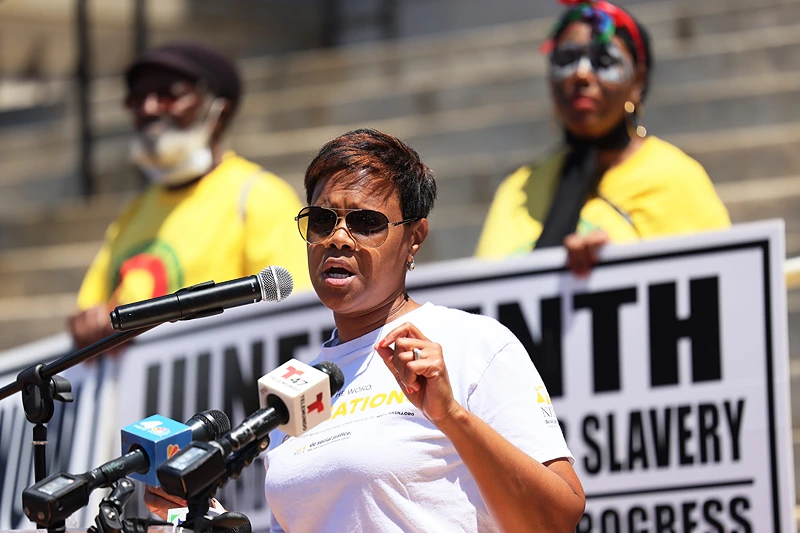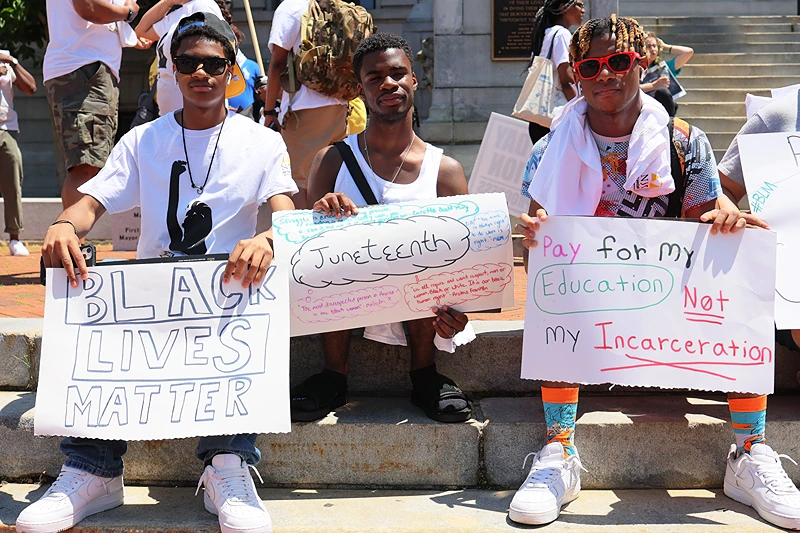
OAN Brooke Mallory
UPDATED 2:29 PM – Wednesday, March 29, 2023
Economists warned a legislative commission studying reparations that paying Black residents for decades of disproportionate policing, incarceration, and housing discrimination could end up costing California more than $800 billion in state revenue.
The preliminary estimate, which excludes the required $1 million per “older” Black person for health inequities that have decreased their average life expectancy, is more than 2.5 times California’s $300 billion annual budget.
The task committee for California convened on Wednesday in Oakland’s City Hall.
Oakland, California, is the birthplace of the Black Panthers, although many Black Americans have left the city as a result of rising home costs and gentrification.
They also claimed that the state depreciated Black enterprises and that it should be held responsible for compensating Black Americans for their properties that were wrongfully confiscated by the government, past or present.
Due to the possibility that California may never follow the experts’ calculations, Black residents may not get cash reparations anytime soon, if at all. On Wednesday, the reparations task committee will review the statistics and then vote on whether to accept the recommendations or come up with their own estimates.
Five economists and policy professionals on the reparations consulting team came up with the suggested number.
“We’ve got to go in with an open mind and come up with some creative ways to deal with this,” said Reggie Jones-Sawyer, an assembly member and lawmaker on the task force responsible for mustering support from other state legislators and CA Governor Gavin Newsom.
Before the meeting, Jones-Sawyer stated in an interview that he needed to seek advice from budget analysts, other lawmakers, and the governor’s office before determining whether the scale of payments was viable. Assessments for disproportionate incarceration, discriminatory housing practices, and the police are nothing new for the task force.
In September, the numbers were mentioned in a presentation when the consulting team was looking for advice on whether to use a national or solely California-based model to determine the damages.
However, the task committee must still decide on a financial sum, as the deadline for legislators to come to a consensus regarding its part in “supporting racist structures” that continue to damage Black Americans approaches on July 1st.
For those who are in favor of reparations, they see the $800 billion figure that economists proposed as a fair sum and a way to make up for what they believe is the traumatic suffering that Black people have endured in California over a long period of time.
Opponents of reparations argue that contemporary taxpayers shouldn’t be held liable for the damages caused by incidents that began hundreds of years ago, and also partly base their criticism on the fact that California was never a slave state and never formally endorsed slavery.
A well-known Black conservative, Bob Woodson, says reparations are unfeasible, divisive, and ultimately ineffective.
“No amount of money could ever ‘make right’ the evil of slavery, and it is insulting to suggest that it could,” he told the press.
He explained how Black people developed strong communities by relying on their families and their beliefs after years of slavery and struggle.
“Some of these communities only began coming apart after we lost sight of these values, which also hold the key to these communities’ restoration,” Woodson maintained.
The task force’s proposals are just the beginning because the state Assembly, Senate, and governor have the final say.
“That’s going to be the real hurdle… How do you compensate for hundreds of years of harm, even 150 years post-slavery?” said Senator Steven Bradford (D-Calif.), who’s on the task committee.
The proposal under consideration includes more than just financial restitution. Additional ideas include prohibiting cash bail, implementing a K–12 Black studies curriculum, building complimentary wellness centers, increasing tree planting in Black-majority areas, and paying jailed inmates market value for their forced labor.
Following widespread protests over the murder of George Floyd, a black man, by Minneapolis police in 2020, Newsom approved legislation establishing the reparations task force.
Different cities, counties, and other organizations have stepped in while federal measures have weakened over time.
A San Francisco advisory council endorsed $5 million payouts, a minimum income guarantee of $97,000, and debt cancellation for qualified individuals.
Supervisors offered their general support but refrained from adopting any particular suggestions. Later this year, they will discuss the subject in more detail.
In order to reward eligible Black Californians whose areas saw severe policing and prosecution of Black individuals throughout the “War on Drugs” from 1970 to 2020, the state’s estimated budget comes out to $246 billion. That would amount to around $125,000 for each eligible person.

Based on demographic projections and modeling, the figures are approximations. Additionally, $569 billion was included by economists to make up for the unfair practice of redlining in housing loans.
Furthermore, this addition would amount to around $223,000 per qualifying resident who lived in California between 1933 and 1977. The $569 billion is regarded as a maximum estimate and is based on the assumption that all 2.5 million Californians who identify as Black would be qualified.
However, it’s still possible that not all Black Americans would qualify. Those who satisfy the residency and other requirements will be the ones eligible for monetary reparation.
Also, individuals must be descended from Black Americans who were both enslaved and later set free in the United States during the 19th century, excluding Black immigrants.
The consultants advised the state task group to “err on the side of generosity” and assess making a down payment with the promise of additional funding as more evidence becomes available in their report.
“It should be communicated to the public that the substantial initial down-payment is the beginning of a conversation about historical injustices, not the end of it,” the task force stated.
- Stay informed! Receive breaking news blasts directly to your inbox for free. Subscribe here. https://www.oann.com/alerts

